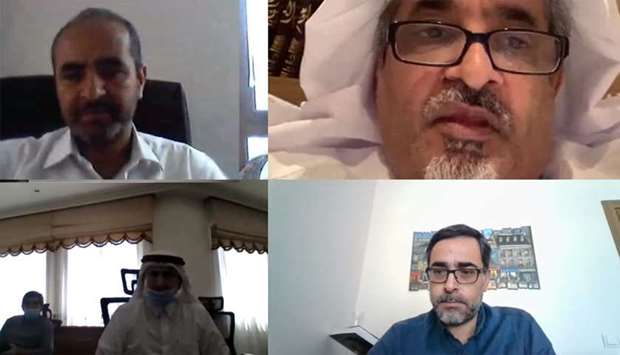Qatar Red Crescent Society (QRCS) has concluded its third annual meeting of foreign offices via video-conference. The five-day event was extended for extra two days, to engage many humanitarian partners in the discussions.
On day two, Ibrahim Abdullah al-Dehaimi, general manager of the Regulatory Authority for Charitable Activities (Raca), took part in co-ordination meetings. He praised the event as an opportunity to build the capacity of foreign personnel and develop institutional work. According to him, Raca seeks effective communication with humanitarian and nonprofit organisations, to boost the leading position of Qatar’s humanitarian sector.
Representatives of QRCS' foreign offices and Raca experts held workshops on governance, transparency, financial procedures, and the regulatory guides and guidelines to reduce humanitarian risks.
Engineer Ibrahim Abdullah al-Maliki, chief executive director of QRC and acting director of Relief and International Development commended fruitful discussions among the participants. He urged the enforcement of updated regulatory guides and formulation of clear recommendations to overcome challenges and improve performance.
Ali bin Hassan al-Hammadi, secretary-general of QRCS, and engineer al-Maliki participated in sessions of day five, which discussed international relations and enhancement of mutual co-operation with components of the Movement.
As a keynote speaker, Dr Hossam Elsharkawi, regional director of the International Federation of the Red Cross and Red Crescent Societies (IFRC) – Mena Region, valued the meeting and called for closer communication and coordination with components of the Movement to control the impact of emergencies, particularly the serious coronavirus pandemic.

Mohamed Mukhier, IFRC deputy regional director – Asia Pacific, said: “QRCS is an outstanding National Society that represents the spirit of the International Red Cross and Red Crescent Movement in humanitarian action in Qatar and globally, as manifested in direct co-operation in many countries”.
On day six, Dr Mohamed bin Ghanem al-Ali al-Maadheed, president of QRCS, participated in the discussions. He emphasised the importance of centering humanitarian action around the ultimate goal of alleviating the suffering of the vulnerable and serving those in need. “We are entrusted with the humanitarian message and action, which requires effective and professional efforts”.
Dr al-Maadheed noted the commitment of QRCS staff to the Red Cross and Red Crescent principles, to ensure independence of humanitarian action at all times. He appreciated the role of all QRCS staff and volunteers in all sectors, whether in the field or at headquarters, combined by institutional and benevolent bonds.
Another session was held by Dr Abdul-Salam al-Qahtani, board member and general director of the Medical Affairs Division, who talked about the best medical and relief practices, reviewing the coronavirus response in partnership with the Ministry of Public Health (MoPH), such as Mekaines and other quarantine facilities, ambulance service, and Workers’ Health Centers.
Al-Hammadi and engineer al-Maliki discussed with the participating heads of foreign offices the results and recommendations to be implemented towards better work at all levels.
The last day of the event was dedicated to joint sessions with Qatar Fund for Development (QFFD). “I would like to thank QFFD for being here. It is important to strengthen the established bilateral strategic partnership,” engineer al-Maliki stated.
Three sessions were held with specialists from QFFD departments, to talk about QFFD development and humanitarian priorities, as well as follow-up and evaluation steps for joint projects. The meeting concluded with a joint session with QFFD’s Compliance and Risk Sector to explain the applicable mechanisms, procedures, and models of compliance and risk management.

